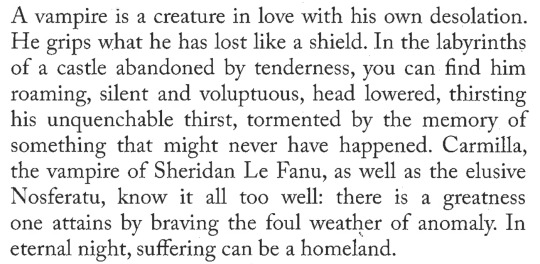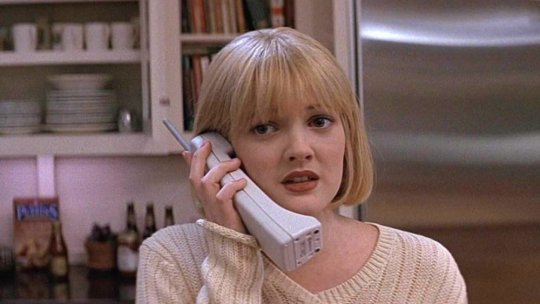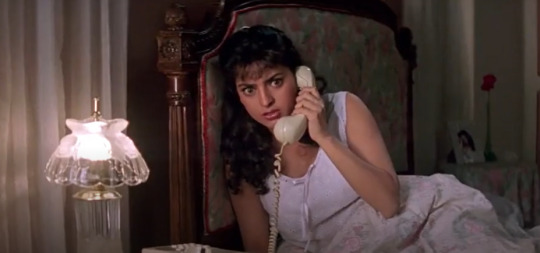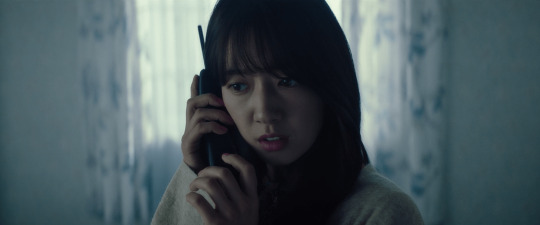Text
“Set aside for a moment the details of the Dracula story. They’ve lost their meaning. They’ve been run through a thousand vampire movies too many. […] Consider instead Count Dracula. He bears a terrible cross, but he lives in a wonderful sphere. He comes backed by the music of the masters and dresses in red and black, the colors De Sade found finally the most restful. Dracula’s shame as he exchanges intimacies and elegant courtesies with you is that tonight or sometime soon he will need to drink your blood. What an embarrassing thing to know about someone else. Werner Herzog’s Nosferatu concerns itself with such knowledge. […] Sit through Nosferatu twice, or three times. Cleanse yourself of the expectation that things will happen. Get with the flow. This movie works like an LP: you can’t love the music until you’ve heard the words so often they’re sounds. It’s in German with English subtitles. It would be just fine with no subtitles, dubbed into an unknown tongue. The need to know what Dracula is saying at any given moment is bourgeois affectation. Dracula is always saying. ‘I am speaking with you now as a meaningless courtesy in preface to the unspeakable event that we both know is going to take place between us sooner rather than later.’”
— Roger Ebert, review of Nosferatu (October 5, 1979), included in Herzog by Ebert
831 notes
·
View notes
Text





Unconscious death is the fate of all mortals. We are conscious death, Annika. And that would make you... a bride.
Ben Daniels as Santiago INTERVIEW WITH THE VAMPIRE 2.02: DO YOU KNOW WHAT IT MEANS TO BE LOVED BY DEATH.

2K notes
·
View notes
Text
Closely linked to Dracula’s hypnotic powers is his telepathic link to Mina. This mental telepathy is mirrored by Uncle Charlie’s seemingly telepathic bond to Charlie, who decides to telegraph her uncle, asking him to visit at the same time Uncle Charlie decides to travel westward to Charlie and the rest of his family in California. That Uncle Charlie can communicate telepathically points to his ability to transcend spatial limitations, as does his unexplained evasion of the pursuing detectives in the Philadelphia section of the film. Charlie recognizes the mental bridge between herself and her uncle for, on learning that her uncle is on his way, Charlie cries, “He heard me, he heard me.” Charlie exclaims ecstatically that “he’ll come for me,” little realizing that her wish is the equivalent of inviting a vampire into her home of her own free will, for Uncle Charlie does indeed come for her as he has been summoned.
Victoria Williams, “Reflecting Dracula: The Undead in Alfred Hitchcock’s Shadow of a Doubt,” in Images of the Modern Vampire: The Hip and the Atavistic (eds. Barbara Brodman and James E. Doan)
185 notes
·
View notes
Photo

— María Negroni, ‘The Exemplary Theater of Sadness’ Dark Museum (translated by Michelle Gil-Montero)
9K notes
·
View notes
Text
An anonymous individual asked @awildwickedslip for recommendations of literary criticism on the gothic, and she directed them to me, so I thought it was time I make a rec list on the topic.
I'm keep this to more general analyses, but of course have a lot of recommendations for more works on more specific texts (especially but not limited to Dracula).
I'm also including some things that are more properly about amatory or epistolary fiction, because I think an understanding of those genres will serve you well in contemplating the gothic.
Mario Praz, The Romantic Agony
Nina Auerbach, Our Vampires, Ourselves
Christy Desmet and Anne Williams (eds), Shakespearean Gothic
Kate Ferguson Ellis, The Contested Castle
David J. Skal, The Monster Show: A Cultural History of Horror
Devendra P. Varma, The Gothic Flame
Angela Carter, The Sadeian Woman
Roland Barthes, Sade, Fourier, Loyola
Elizabeth Cook, Epistolary Bodies
Jacqueline Howard, Readng Gothic Fiction: A Bakhtinian Approach
Toni Bowers, Force or Fraud: British Seduction Stories and the Problem of Resistance
Peter Cryle, The Telling of the Act: Sexuality as Narrative in Eighteenth- and Nineteenth-Century France
Peter Cryle, Geometry in the Budoir: Configurations of French Erotic Narrative
Jalal Toufic, Vampire: An Uneasy Essay on the Undead in Film
Ruth Bernard Yeazell, Harems of the Mind: Passages of Western Art and Literature
Marianne Noble, The Masochistic Pleasures of Sentimental Literature
Terry Castle, The Female Thermometer: Eighteenth Century Literature and the Invention of the Uncanny
866 notes
·
View notes
Text
“On her way back across the campus she did not find anything particular in her mind to identify this evening beyond others marked in other ways. There was a strong feeling of triumph and an odd feeling of vengeance, and once when she stopped under a tree and leaned her head against its firm rough trunk she whispered softly, ‘I know, I know.’ But that was all; beyond that she seemed to have nothing to say to herself.”
— Shirley Jackson, Hangsaman
19 notes
·
View notes
Text
“‘I was thinking about when I would be dead,’ Natalie said.
‘Dead?’ he said, surprised. ‘Are we going to die, you and I?’
‘I only worry about how,’ Natalie said soberly; unlike most of the things she found herself saying to Arthur Langdon, this was true. ‘I keep thinking that of course it’s got to happen, and even to me, but then I always think that somehow and someday this interesting person of mine will . . .’ She searched for a word. ‘Subside,’ she said finally. ‘I mean, I will be very suddenly aware of an ending, and that there is not going to be anymore for me, and that I am not going to be with myself any longer. And all of that’s all right,’ she said, going on quickly as he opened his mouth to speak. ‘I’m only afraid of being caught unaware, of that terrible fast panic that comes when you’re very very frightened, and of being afraid when it happens. So then, of course, I always think I’ll kill myself before it can happen.’
She stopped, and Arthur Langdon said, ‘You have a very original mind, Natalie.’
‘That’s what I mean,’ she said, thinking, Oh, the fool, ‘can you imagine having a mind like mine and losing it when you die?’ Had she, she wondered, had she the original mind?”
— Shirley Jackson, Hangsaman
13 notes
·
View notes
Text
“Natalie, looking at them with a frank stare possible only because they were both looking at Arthur and for the moment ignoring both herself and Elizabeth, saw with the irritation she was beginning to know as jealousy that they were both lovely, in the way that Elizabeth Langdon was lovely: the rounded, colorful, rich beauty of girls who have been pretty babies and pretty little girls and pretty boarding school girls and who have, at last, in college, reached a fulfillment of prettiness because they are finally nubile; that their loveliness would be deadened as Elizabeth’s had been deadened was not more than a small consolation to Natalie; that this loveliness built and recharged with an awareness of loveliness, and almost certainly masked vacant stupidity, was no consolation at all. The further thought that, premising the loveliness of young women as nature’s infallible way of insuring them husbands, these two could at best marry no more than a few of the men in the world, was less than no consolation at all.”
— Shirley Jackson, Hangsaman
1 note
·
View note
Text
“What a silly routine, Natalie thought, not realizing, sitting there alone on the stool in the center of the ring of girls, how she was jeopardizing her own future in college, her own future for four years and perhaps for the rest of her life; how even worse than the actual being a bad sport was the state of mind which led her into defiance of this norm, this ring of placid, masked girls, with their calm futures ahead and their regular pasts proven beyond a doubt; how one person, stepping however aside from their meaningless, echoing standards, set perhaps by a violent movement before their recollection, and handed down to them by other placid creatures, might lose a seat among them by questions, by rebellion, by anything except a cheerful smile and the resolution to hurt other people.”
— Shirley Jackson, Hangsaman
2 notes
·
View notes
Text
“‘A mother gets very lonesome without her daughter,’ Miss Waite said. ‘Especially when it’s an only daughter. A mother gets lonesomer than anything in the world.’
One of the things which Natalie most disliked about her mother was Mrs. Waite’s invariable trick of putting serious statements into language that Natalie classified as cute. Mrs. Waite, too long accustomed to seeing her most heartfelt emotions exposed, discussed, and ignored, had long since fallen into protecting herself by stating them as jokes, with an air of girlish whimsy which irritated both Natalie and Mr. Waite as no flat statement of hatred could have. Because of this, Natalie—who had sometimes thought of running to her mother with a voluntary expression of affection—said briefly, ‘You’ll find something to do.’”
— Shirley Jackson, Hangsaman
39 notes
·
View notes
Text
“At that time, of course, Natalie reflected with contentment, her life would be done. There would be no further fears for Natalie, no possibility of walking wrong when you were no more than a skull in a strange man’s hands.”
— Shirley Jackson, Hangsaman
36 notes
·
View notes
Text
“In his history of German film art, a Nazi-minded product with some remnants of pre-Nazi evaluations, Oskar Kalbus connects the vogue of historical pageants with the moment of their production; they were produced, he contends, ‘because in times of national emergency people are particularly susceptible to representations of great historic periods and personalities.’ He completely overlooks the fact that this susceptibility was betrayed by films representing not so much historical periods as personal appetites and seeming to seize upon history for the sole purpose of removing it thoroughly from the field of vision. It is not as if the historical films of Italian or American origin had ever achieved miracles of perspicacity; but the sustained lack of comprehension in the Lubitsch films is significant inasmuch as they emerged at a moment when it would have been in the interest of the new democratic regime to enlighten the people about social and political developments. All these German pageants which the Americans mistook for summits of ‘historical realism’ instinctively sabotaged any understanding of historic processes, any attempt to explore patterns of conduct in the past.”
— Siegfried Kracauer, From Caligari to Hitler: A Psychological History of the German Film
1 note
·
View note
Text
“It also reinforces one of the essential thematic concerns of haunted house tales: their fascination with history and the consequences of history, the danger of crimes that fester undiscovered and unpunished.”
— Dale Bailey, excerpt from “Too Bad We Can’t Stay, Baby!” of American Nightmares: The Haunted House Formula in American Popular Fiction
747 notes
·
View notes
Text
need to write an essay abt how most horror movies centered around haunting aren't actually about the haunting but are instead horror stories about economical desperation ("someone died here but it's the only place we can afford" + "we already claimed the house, we don't have money to move again") & the terror of no financial mobility + a flawed reinforcement of the white american standard that the father should protect his family to the point of dismissing his wife & kids while also conquering land/property that is not his ("this house was built on a native american burial ground")
4K notes
·
View notes
Text
someone unearthed this and it’s been getting notes, but it’s come to my attention that this website no longer /exists/ as it once did, alas. you can probably find most of these online anyways, but if anyone is having trouble tracking them down feel free to message me, i still have the pdfs so i can share them or w/e.
essays on Blue Sunshine’s website (leftovers from a horror film syllabus, I think)
Robin Wood, “Horror in the 70s,” The American Nightmare: Essays on the Horror Film
Barbara Creed, “An Imaginary Abjection,” The Monstrous-Feminine: Film, Feminism, Psychoanalysis
Linda William, “When the Woman Looks”
Carol Clover, “Her Body, Himself: Gender in the Slasher Film”
Steven Shaviro, “Bodies of Fear: The Films of David Cronenberg”
Noël Carroll, “Why Horror?,” The Philosophy of Horror, or Paradoxes of the Heart
Cynthia Freeland, “Horror and Art-Dread”
159 notes
·
View notes
Note
Hello! Could i possibly request a pdf/ebook/any format of diana fuss’s monsters of perversion?
hey! i wish i could help, but i've had no luck either with finding the full thing; if you g**gle it then a g**gle books result pops up for media spectacles, the book it’s part of, and if you click that then you can read some of “monsters of perversion,” and that's what the quotes on my blog are from. (even there, a few pages are randomly blocked *rolls eyes*).
EDIT: i’m a dumbass; the book is on libgen, i’ve just been searching for the essay title all these years. 😅 so um you know. or if u don’t know how to use that then u can hmu off anon.
6 notes
·
View notes
Text



The telephone’s influence is so pervasive that only when things go wrong with the technology – for example, a thunderstorm renders it inoperative – do our problem of isolation becomes apparent. Suddenly we cannot call the police or the ambulance for help, and friends who might otherwise provide companionship and advice become unreachable. Isolated, we find ourselves at our most vulnerable – and if it’s the killer who has cut the line, then we also feel a sense of threat.
Charles Spiteri, "Isolation, the Telephone and the Slasher Film"
3K notes
·
View notes